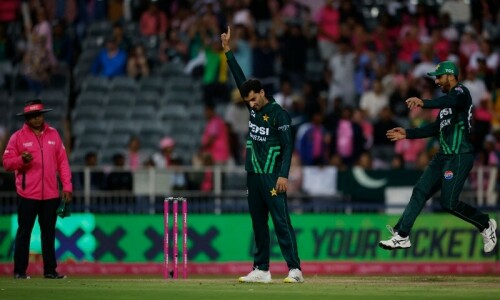How Pakistan can resolve its batting crisis

“Imran Farhat ko dekhte dekhte mujhe baara saal ho gaye hain, majaal hai ke kaheen chal jaye yeh bacha.”
Those were the words Wasim Akram used in the aftermath of Pakistan’s loss to South Africa in the Champions Trophy. One thing it proved was how language affects a commentator; Wasim has often been accused of being verbose and not sharp enough when commentating in English, neither of which was the case in his paean to Imran Farhat. He summed up the thoughts of the majority of the cricket watching public in Pakistan far more succinctly than they would have been capable of. And he did ask a most pertinent question: why was Imran Farhat in the team in the first place?
His fans – and yes, there are some – would argue about his performance in the domestic season. That, of course, ignores the fact that the Quaid-e-Azam Trophy, this season (due to rule changes), was of a far lower standard than the President’s Trophy – which can now be considered Pakistan’s premier four-day competition. And Farhat excelled far more in the QeA than in the President’s Trophy. This raises a few questions regarding the standard and conditions of the domestic season; but ignores the fact that Farhat was selected for the ODIs despite not performing in the President’s Cup (the foremost 50-over tournament in the country). He failed to score a fifty in the List A matches this year, after all. But regardless of all that, the point to be made in this case is about realizing one’s limitations. There are players the world over, and across many different sports, that are often too good for the second tier but not good enough for the very best; sportsmen who revel in minnow bashing.
As Wasim said, over the past twelve years Pakistan have had enough time, and evidence, to realize that Farhat belongs in that category. Surely the only thing more important for selection than domestic performance should be the past international record. And Farhat has proven his credentials – averages bordering on thirty after 40 Tests and 58 ODIs is not the record of someone to be relied upon.
The same can be said of Shoaib Malik; he too has excelled at the domestic level when he has needed to, but over the past five years his value as an international cricketer – which was never that high in the first place – has gone into an inexorable decline. Before this tour he has been a regular for most of the past eighteen months, despite never justifying his position. He had not averaged over 35 in any of the ten series he has played since the 2009 Champions Trophy; add that to him not being anything more than the sixth bowler, and his continued selections become difficult to defend. Particularly since he has now stopped even scoring against India, who used to be his favourite whipping boys until not that long ago.
Fawad Alam has the highest First Class average in Pakistani history.
The cases for Kamran Akmal and Muhammad Hafeez are more complex than these two. These two offer more than just with the bat – Hafeez far more than Akmal at that. Pakistan could begin by sacking the first two, though. Even when Malik and Farhat are sacked, they will likely be replaced by Younis Khan Shahid Afridi – two other players whose contribution to the ODI team has been insignificant in the past couple of years. Younis might well be the greatest Test batsman in Pakistan’s history, but he has never been a great ODI player – another example of Pakistan’s refusal to learn from the past. But if they do come back we will hear the commentators – including the chairman of the selection committee – say that there just isn’t enough talent in Pakistan. Talent is an odd beast; in Pakistan’s case it can range from zero to infinity based on the speaker’s motives.
So is there no batting talent in Pakistan? Well, there are Umar Akmal and Fawad Alam, two of the four current Pakistan players who average above 35 in ODIs. I wrote about Umar Akmal more than a year ago,and my opinion hasn’t really changed that much. Meanwhile, Alam has the highest First Class average in Pakistani history but isn’t considered good enough for the national side for no apparent reason. The style of these two can be argued upon, but I would rather have someone who throws his wicket away (or cannot hit the ball far enough) averaging forty ahead of someone who is safe, sound and correct but averages thirty. Cricket, for all the guff, is just a game of numbers. This duo has always been treated poorly by the team management, and that is the reason that years after their debuts neither has found a role in the team. Umar Akmal, despite how he has been dealt with, is the only player apart from Nasir Jamshed who averages above 35 at a strike rate above 80. For all the criticism of the style of Fawad, he is the best rotator in Pakistan – he has the lowest dot ball percentage of Pakistani batsmen in this century. And if we have a problem with those two, there are other left-field options to be tried. Haris Sohail averaged 134 in the President’s Trophy (no one else averaged more than 53); in another country he would have been declared the messiah and drafted into the team straight away, much like Kushal Perera. Not so in Pakistan. Sohaib Maqsood, in his breakout season, had the most 50+ scores in both the President’s Trophy and the President’s Cup – where he was also the highest scorer in the competition. Yet he wasn’t considered good enough for the 30-man longlist for the Champions Trophy.
Ignoring the argument over the meaning and value of stats for another day, the fact remains that the selection committee does have options. Of course none of them are truly ready to take it to the final level; the reasons for which are the structure of the national game – which too is a debate for another day. Pakistan should have used the time between the 2011 World Cup until now building a team for the future. Instead, with the captain under fire before every series, conservative options have been taken and Pakistan are further away from an ideal team now than they were two years ago. The past two years should have been used to build a batting team around Misbah-ul-Haq with the options including all the names mentioned in the previous paragraph, in addition to Azhar Ali and Asad Shafiq. Neither of those two are truly built for the shorter formats, but they deserve their chance to fail far more than the proven failures, owing to their success in Test cricket.
The argument made by Misbah and the selection committee has been that Pakistan need experienced batsmen; but the experience in their cases is one of failure. Pakistan now have 20 months, almost exclusively in friendly conditions, before the World Cup in Australia and New Zealand. They could begin the process of building for that by removing the deadwood. Pakistan were fortunate to lose the game against India too, as any victory there could have given the apologists something to hold on to – but now Pakistan are in an ideal crisis for change to occur. But optimism, especially with the selections process, is in short supply in Pakistan; unlike the supposed talent.













































